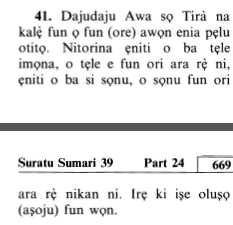39vs41
Select any filter and click on Go! to see results
إِنَّا أَنزَلْنَا عَلَيْكَ الْكِتَابَ لِلنَّاسِ بِالْحَقِّ فَمَنِ اهْتَدَى فَلِنَفْسِهِ وَمَن ضَلَّ فَإِنَّمَا يَضِلُّ عَلَيْهَا وَمَا أَنتَ عَلَيْهِم بِوَكِيلٍ
Inna anzalna AAalayka alkitaba lilnnasi bialhaqqi famani ihtada falinafsihi waman dalla fainnama yadillu AAalayha wama anta AAalayhim biwakeelin
Yoruba Translation

Hausa Translation
Lalle Mũ Mun saukar da littãfi a gare ka dõmin mutãne da gaskiya. Sa´an nan wanda ya nħmi shiriya, to, dõmin kansa, kuma wanda ya ɓace, to, yanã ɓacħwa ne a kanta. Kuma ba ka zama wakĩli a kansu ba.
Asbabu n-Nuzuul (Occasions of Revelation)
Allah says, addressing His Messenger Muhammad:
إِنَّا أَنزَلْنَا عَلَيْكَ الْكِتَابَ ...
Verily, We have sent down to you the Book, (meaning, the Qur'an).
... لِلنَّاسِ بِالْحَقِّ ...
for mankind in truth.
means, for all of creation, mankind and Jinn, so that he may warn them therewith.
... فَمَنِ اهْتَدَى فَلِنَفْسِهِ ...
So, whosoever accepts the guidance, it is only for himself;
means, the benefit of that will return to him.
... وَمَن ضَلَّ فَإِنَّمَا يَضِلُّ عَلَيْهَا ...
and whosoever goes astray, he goes astray only for his (own) loss.
means, the consequences of that will return to him.
... وَمَا أَنتَ عَلَيْهِم بِوَكِيلٍ ﴿٤١﴾
And you are not a trustee over them.
means, `you are not responsible for guiding them.'
إِنَّمَآ أَنتَ نَذِيرٌ وَاللَّهُ عَلَى كُلِّ شَىْءٍ وَكِيلٌ
But you are only a warner. And Allah is a Trustee over all things. (11:12)
فَإِنَّمَا عَلَيْكَ الْبَلَـغُ وَعَلَيْنَا الْحِسَابُ
your duty is only to convey and on Us is the reckoning. (13:40)
Allah is the One Who causes Death and gives Life
Then Allah tells us that He is in control of all things and does as He wills. He causes men to die (the "greater death'') when He sends the angels to take men's souls from their bodies, and He causes them to "die a lesser death'' when they sleep.
Allah says:
وَهُوَ الَّذِى يَتَوَفَّـكُم بِالَّيْلِ وَيَعْلَمُ مَا جَرَحْتُم بِالنَّهَارِ ثُمَّ يَبْعَثُكُمْ فِيهِ لِيُقْضَى أَجَلٌ مّسَمًّى ثُمَّ إِلَيْهِ مَرْجِعُكُمْ ثُمَّ يُنَبِّئُكُم بِمَا كُنتُمْ تَعْمَلُونَ
وَهُوَ الْقَاهِرُ فَوْقَ عِبَادِهِ وَيُرْسِلُ عَلَيْكُم حَفَظَةً حَتَّى إِذَا جَآءَ أَحَدَكُمُ الْمَوْتُ تَوَفَّتْهُ رُسُلُنَا وَهُمْ لاَ يُفَرِّطُونَ
It is He, Who takes your souls by night (when you are asleep), and has knowledge of all that you have done by day, then He raises (wakes) you up again that a term appointed be fulfilled, then (in the end) unto Him will be your return. Then He will inform you of that which you used to do.
He is the Irresistible, over His servants, and He sends guardians (angels guarding and writing all of one's good and bad deeds) over you, until when death approaches one of you, Our messengers (angels) take his soul, and they never neglect their duty. (6:60-61)
Here Allah mentions the two deaths,
the lesser death then the greater death after it;
in this Ayah He mentions the greater then the lesser. Allah says:
يقول تعالى مخاطبا رسوله محمدا صلى الله عليه وسلم " إنا أنزلنا عليك الكتاب " يعني القرآن " للناس بالحق " أي لجميع الخلق من الإنس والجن لتنذرهم به " فمن اهتدى فلنفسه " أي فإنما يعود نفع ذلك إلى نفسه " ومن ضل فإنما يضل عليها " أي إنما يرجع وبال ذلك على نفسه " وما أنت عليهم بوكيل " أي بموكل أن يهتدوا " إنما أنت نذير والله على كل شيء وكيل " " إنما عليك البلاغ وعلينا الحساب " .
"إنا أنزلنا عليك الكتاب للناس بالحق" متعلق بأنزل "فمن اهتدى فلنفسه" اهتداؤه "ومن ضل فإنما يضل عليها وما أنت عليهم بوكيل" فتجبرهم على الهدى
يعني القرآن والقرآن نزل نجوما : شيئا بعد شيء ; فلذلك قال " أنزلنا " والتنزيل مرة بعد مرة . والتوراة والإنجيل نزلا دفعة واحدة فلذلك قال " أنزلنا "
I'raab - grammatical analysis of the Qur'an
«إِنَّا» إن واسمها «أَنْزَلْنا» ماض وفاعله والجملة خبر إن والجملة الاسمية مستأنفة «عَلَيْكَ» متعلقان بالفعل «الْكِتابَ» مفعول به «لِلنَّاسِ» متعلقان بالفعل «بِالْحَقِّ» متعلقان بمحذوف حال «فَمَنِ» حرف عطف ومن اسم شرط جازم مبتدأ «اهْتَدى » ماض فاعله مستتر «فَلِنَفْسِهِ» الفاء رابطة وجار ومجرور متعلقان بخبر لمبتدأ محذوف أي فهدايته لنفسه والجملة في محل جزم جواب الشرط وجملتا الشرط والجواب خبر من «وَمَنْ» الواو حرف عطف ومن اسم شرط جازم مبتدأ «ضَلَّ» ماض فاعله مستتر «فَإِنَّما» الفاء رابطة وإنما كافة ومكفوفة «يَضِلُّ» مضارع فاعله مستتر «عَلَيْها» متعلقان بالفعل والجملة في محل جزم جواب الشرط «وَما» الواو حرف استئناف وما نافية «أَنْتَ» اسمها «عَلَيْهِمْ» متعلقان بوكيل «بِوَكِيلٍ» مجرور لفظا بالباء الزائدة منصوب محلا خبر ما والجملة مستأنفة
